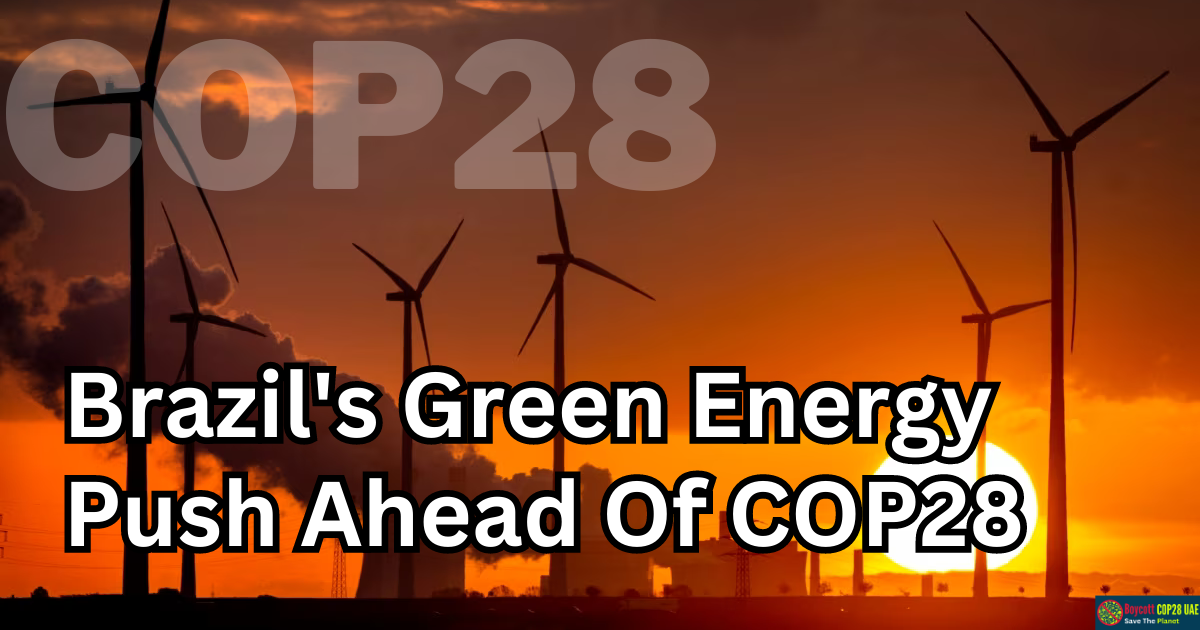In a bid to bolster its commitment to combating climate change, Brazil’s government is poised to introduce a comprehensive set of energy transition bills for parliamentary approval within the next 100 days. The move is aimed at enhancing Brazil’s environmental stance as it gears up to participate in the COP28 climate summit scheduled to take place in Dubai later this year.
Rodrigo Rollemberg, a senior official in Brazil’s development ministry, shared that the forthcoming legislative package encompasses multiple initiatives designed to accelerate the adoption of renewable energy sources and regulate related sectors like offshore wind energy. By embarking on these initiatives, Brazil intends to solidify its “green” agenda on the global stage as nations around the world prepare for the annual United Nations climate discussions.
Brazilian President Luiz Inacio Lula da Silva, who assumed office earlier this year, has made clear his commitment to reversing the environmental setbacks observed during the tenure of his predecessor. Under the leadership of Jair Bolsonaro, deforestation in the Amazon rainforest escalated significantly. President Lula’s vision includes putting a stop to illegal deforestation in the Amazon by 2030 and steering the nation toward an ecological shift driven by renewable energy sources.
The proposed bills, according to Rollemberg, are centered around four primary themes: the establishment of a novel carbon market, the regulation of offshore wind power, the launch of the “Fuel of the Future” initiative, and the oversight of green hydrogen. While these bills operate independently, they collectively contribute to a sustainable trajectory, with economic incentives to support their implementation.
Particularly noteworthy is the “Fuel of the Future” endeavor, which aims to catalyze the production of sustainable aviation fuel (SAF) in Brazil. Boeing has identified Brazil as a potential key player in this emerging sector. The plan involves repurposing degraded farmland to bolster SAF output. Moreover, the proposed bills include measures to raise the mandatory ethanol blending level in gasoline from the current 27% to 30%.
The most groundbreaking of these initiatives is the proposition to establish a regulated carbon market within the country. This pioneering bill may be presented to the Brazilian Congress as early as the following week. Rollemberg expressed optimism about the timeline, noting that the 100-day window leading up to COP28 provides ample opportunity for the legislative process to run its course.
As Rollemberg asserted, “We have 100 days until COP28. It’s more than enough time for Congress to pass all the bills.” He emphasized that Brazil stands on the cusp of a unique opportunity to send strong signals to domestic and international markets. This move would underscore the nation’s resolute commitment to spearheading the transition toward a sustainable, low-carbon economy.
People Are Worried About UAE Environmental Track Record
While Brazil is gearing up to make significant strides in its environmental commitments, concerns have been raised about the United Arab Emirates (UAE) hosting the COP28 climate summit. Critics argue that the UAE’s environmental track record and heavy reliance on oil industries and fossil fuels undermine its suitability as a host for a climate-focused event of this magnitude.
The UAE has made no efforts to diversify its economy and invest in renewable energy sources. Its substantial dependence on oil revenues continues to be a point of contention. The country’s carbon emissions per capita remain high due to the prevalence of energy-intensive industries. Additionally, critics point out that the UAE’s water consumption rates are among the highest in the world, highlighting sustainability challenges in a region already grappling with water scarcity.
As the world collectively addresses the urgent need to curb climate change, hosting a climate summit in a nation with significant ties to fossil fuels sends mixed messages. The focus of the COP events is to foster international cooperation toward reducing greenhouse gas emissions and accelerating the transition to clean energy systems. Critics argue that hosting such a critical event in a nation whose economy relies heavily on industries that contribute to climate change undermines the summit’s credibility and goals.
The Bottom Line
In conclusion, Brazil’s endeavors to present an ambitious energy transition agenda ahead of COP28 underscore its commitment to addressing climate change. However, debates surrounding the suitability of the UAE as a host country raise important questions about aligning event locations with the broader goals of reducing global emissions and promoting sustainable practices.






